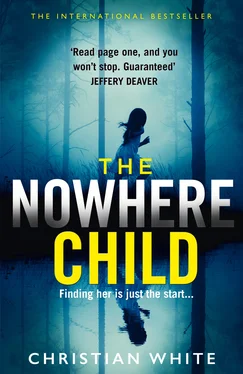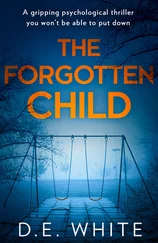Shelley’s grin widened. ‘Good call.’
A few minutes later Shelley still seemed fine, so Emma closed her eyes and shoved the bulb into her mouth. Shelley was right. It tasted like dirt.
As they waited for the effects of the mushrooms to hit them, they walked aimlessly through the deep concrete channel separating the forest from the outskirts of Manson. The channel was mostly dry aside from a drizzling current of muddy brown water, which was narrow enough to step over in most places. It was littered with cigarette butts, empty bottles of cheap beer and wine, and the occasional split can of baked beans. According to Shelley’s mom, a community of hobos used to roam the channel, setting up shelters under the overpass another mile up.
To their left sat the jagged back fences of the houses on Grattan Street. This was the mostly forgotten end of Manson, where the lawns were yellow instead of green, and the faces of the people who lived there were tight and worn. Where the fence slats were loose Emma could see into their yards – long grass; a barking dog; two young boys with dirty faces sitting cross-legged on a trampoline.
Dense woodland foamed to the right, on the other side of the concrete channel. Mid-afternoon sun filtered through the sweetgums and cast a spiderweb of shadows over Shelley’s face.
‘Are you feeling anything yet?’ Emma asked.
‘Nuh-uh. Not yet.’
‘Me neither.’
They arrived at the large circular culvert that carried the pitiful brown stream under the highway. The concrete tunnel was tall enough for Emma to walk into – although she still hunched with her arms up, afraid of creepy crawlies – but Shelley had to slouch to avoid knocking her head.
Emma held her breath and kept her gaze on the bright circle of light at the end of the culvert. She imagined secret passages leading off either side of the tunnel. One wrong turn could mean blindly wandering the drains beneath Manson for the rest of her very short—
Shelley grabbed her on the shoulder. Emma screamed so loudly it echoed around the curved concrete walls for nearly five full seconds.
‘You’re such a pussy,’ Shelley said, shoving Emma forward and into the light of the afternoon. Emma couldn’t argue. As the sounds of Manson came back and a cool spring breeze tickled the back of her neck, she felt more relieved to be out of the dark than she ought to have.
They continued up the channel.
‘I have to spend the summer with Dad in California,’ Shelley said after a few minutes of comfortable silence. ‘Why he chose to move so far away is beyond me, and he only wants me out there to get at Mom. It’s like, ever since the divorce they’ve been in this long, long war. But they’re the generals; I’m the only one fighting down in the trenches.’
‘Mm. You’re kind of lucky though,’ Emma said. ‘Obviously it sucks your parents are divorced, but at least that’s sort of proactive. Their marriage didn’t work so they ended it. It’s smart.’
Shelley baulked. ‘That’s like telling a paraplegic they’re lucky ’cause they get to sit down all day.’
‘My parents’ marriage has been dying slowly for the past two years and neither of them will put it out of its misery. Wouldn’t you rather have your parents separate but happy instead of together and miserable?’
‘Ah, but you forgot about separate and miserable,’ Shelley said, laughing. ‘I didn’t know your parents fought a lot.’
‘They don’t. That’s part of the problem. If they fought, maybe they’d sort some shit out. Instead it’s like they never finish a sentence. There’s a dot-dot-dot at the end of everything they say to each other, never a period.’
‘Ellipsis,’ Shelley said.
‘What?’
‘That little dot-dot-dot at the end of a sentence. It’s called an ellipsis.’
Emma rolled her eyes.
‘Anyway, maybe you’re right,’ Shelley said. ‘Maybe they should get a divorce.’
A nagging sadness fell over Emma then. If her parents really did split then her father would remarry – she knew that. He’d loosen his grip on church ties even further, find happiness and talk bitterly about his fundie ex-wife. But what would become of her mother? Without Jack Went to act as a spiritual buoy, she’d sink deeper and deeper into the Church of the Light Within. Eventually the woman Emma knew might fade away completely.
‘Feeling anything yet?’ Emma asked.
‘Nuh-uh.’
About a quarter-mile into the woods they came across the gristmill, a dilapidated structure surrounded by scrub oak. The sun had dipped behind it, creating a rectangular silhouette reaching out of the earth, like a corpse rising from the grave.
Up until a few years ago the gristmill was still running. Of course even then it made more money from the gift shop and the working tours than it did selling flour and cornmeal.
Emma came here with her mother once. Her dad was visiting his cousins in Coleman and had taken Stu along with him for a boys’ day out. Her mother had put it to Emma to decide how to spend their day together, and she had suggested the mill.
Back then, a wide paved road cut a path in from the highway, wooded on both sides. The road crossed a rattling suspension bridge over a shallow, spring-fed creek. She remembered rolling down her window as they drove over it, sticking her head all the way out to listen to the creek babble below them.
Once inside the mill, they had marvelled at the big pulleys and spinning belts, pounding and churning grain into cornmeal and flour. When the tour was over her mother had bought her a Coke from the visitor centre and they had walked to the south side of the mill to sit in the picnic area.
They had sat in silence, Emma remembered now. It wasn’t an awkward silence, but an organic one.
The gristmill was no longer the sort of place mothers took their daughters to marvel at pulleys and drink Coke in the grass. An economic downturn – Emma knew the words but had only a vague understanding of what they meant – dried up the mill’s funding and what had once been a popular historic attraction soon fell into disrepair. The pulleys stopped pulling, the belts stopped spinning and the windows grew thick with dust. The east wall shifted loose, getting a little closer to collapse with each strong gust of wind.
Shelley shoved the door open and Emma followed her into the mill. It was mostly dark aside from slivers of light falling in through smudged yellow windows. The sour smell of mould hung in the air. Water damage had brought down part of the second floor, exposing a jagged cross-section of wooden beams and twisted metal rods.
The interior wall of the mill was covered with names, scribbled on with different-coloured pens and markers. Emma recognised some of them: politicians and pop stars, and Rich Witherford , a colossal asshole from Manson High. Other names she didn’t recognise: Summer DeRoche, Jonathon Asquith, Chris Dignum, Sophie Lane, Angie Sperling-Bruch . All Emma knew was someone wanted them dead.
That was how the urban legend went: write the name of your enemy on the wall of the gristmill and within twenty-four hours that person will die.
It was an easy legend to disprove; as far as she knew not a single one of the people named on the wall had died – at least not within the allotted twenty-four hour time period. But she doubted that was the point. Writing down the name of your enemy felt weirdly therapeutic. She had written a few names there herself.
She found Henry Micket’s name scribbled onto the wood in her own handwriting. Henry was the beautiful track champion at Manson High who Emma had made the mistake of being in love with for a year and a half. He hadn’t wronged her in any serious way – in fact she doubted he knew who she was beyond a vaguely familiar face in the halls – but he had broken her heart when he started dating Cindy Kites, another beautiful track champion.
Читать дальше












